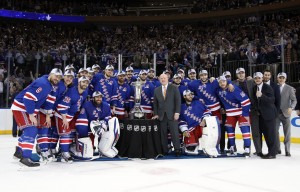New York Rangers fans may want to flock to the NHL Powered by Reebok Store in midtown Manhattan or take a glance at eBay so they can pick up a 2009 Stanley Cup Champions Pittsburgh Penguins t-shirt or hat. If the Rangers are going to win the 2014 Stanley Cup Final, they are going to be battling an uphill climb that only one team has been able to overcome dating back to 1987.
The Rangers were the first team this spring to punch their ticket to the 2014 Stanley Cup Final. Now, the Rangers and their fans will sit back and wait to see who will win the Western Conference Final between the Los Angeles Kings and the Chicago Blackhawks. But by clinching first, are the Rangers benefiting or will their extra rest and preparation time hinder their chances of winning the Stanley Cup? The Hockey Writers takes a look back at the last 26 Stanley Cup Finals:

The First Team to Reach the Stanley Cup Final…
In just 10 of the last 26 Stanley Cup Finals the team that clinched first won, a winning percentage of 38.5%. In 3 of the 8 Stanley Cup Finals since the 2004-2005 lockout, the team that clinched first won for a winning percentage of 37.5%, on par with the last 26 Finals, except the team that clinched first has won 3 of the last 5 Finals.
When breaking it down by conference the numbers are staggering:
The East clinched first (11) times and won (3) times for a winning percentage of 27.3%
The West clinched first (15) times and won (7) times for a winning percentage 46.7%
The Team With Home-Ice Advantage in the Stanley Cup Final…
When going by home-ice advantage in the Finals the outcome is expected but still a bit surprising:
The team with home-ice advantage and thus more points since the 1987 Stanley Cup Finals has won (20) of the (26) Finals, a winning percentage of 77%.
*In 1992, the Pittsburgh Penguins and Chicago Blackhawks finished tied in points but Pittsburgh won the first tie-breaker with three more victories during the regular season.
When breaking down the home-ice advantage by conference the numbers are fairly even with the edge going West:
The East won (8) of (11) series in which they had home-ice advantage a winning percentage of 72.7%
The West won (12) of (15) series in which they had home-ice advantage for a winning percentage of 80%
Clinch First + Home Ice Advantage in the Stanley Cup Final…
In the (10) series in which the team that clinched a berth first won the Final, the team that clinched first and had home-ice advantage won (8) times. The only two exceptions are recent. The Kings clinched first in 2012 and the Penguins clinched first in 2009 and won despite the runner-up having more points during the regular season.
How does this fair for the Rangers?
The Rangers odds are stacked against them if we go back through the last 26 Finals. However, if we go by recent memory their chances of winning improve slightly.
Based solely upon being the first team to clinch, they are fighting against a 38.5% winning percentage.
Based solely upon being an Eastern Conference team and clinching a berth first, they are going up against a 27.3% winning percentage.
Based solely upon the home-ice disadvantage factor, they are fighting against a 23% winning percentage.
Based solely upon being an Eastern Conference team without home-ice advantage they are battling a 20% winning percentage.
For what it is worth, the 1994 Vancouver Canucks clinched first and opened the Final on the road…and lost to Mark Messier, Mike Richter, Brian Leetch, and the Presidents’ Trophy winning New York Rangers.
(11) Eastern Conference teams clinched the first berth in the Stanley Cup Final since 1987, and (7) times they opened the Final on the road. Only (1) of those (7) teams came out victorious.

Simply put, after going through Sidney Crosby, Evgeni Malkin, and company in the second round this postseason, the Rangers are going to try their best to replicate the 2009 Pittsburgh Penguins.
The 2009 Pittsburgh Penguins are the only Eastern Conference team to clinch a berth in the Final first and not have home-ice advantage in the Final since 1987 to come out lifting Lord Stanley’s Cup.